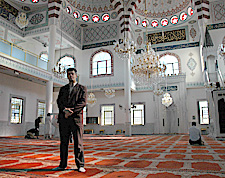Mehmet Saral is a well-known face in two different worlds " the Gallipoli mosque at Auburn and an Anglican home group in Beverly Hills.
Over the past six months the Muslim community leader has been meeting regularly for a "home encounter' with other Muslims and a group of Anglicans from St Bede's, Beverly Hills.
He says it was a way to promote understanding of each other's faiths.
"It was a way to get to know the other " we realise we are both human beings," Mr Saral says.
Mr Saral says he was also impressed by the Christians’ knowledge of the Bible.
"They [St Bede’s church members] understood the Bible very well," Mr Saral says.
"We [Muslims] don't fully understand it but appreciate it and respect it."
Mr Saral's job is to bring Christians and Muslims together through his work as an interfaith spokesperson with the Muslim-based Affinity Intercultural Foundation.
Mr Saral hopes the existence of the group will encourage more Christians to consider working with Affinity in their own churches.
Affinity first developed the home encounter groups with St Charles Catholic Church in Ryde and then invited the Strathfield and Homebush Uniting Church to participate in trial groups.
The aim of the groups is to read parts of the Bible and the Koran and discuss concepts in the different faith traditions such as holy war, family and marriage, monotheism and prophets.
Former CMS missionary encourages Muslim and Christians to unite on social issues
One of the members of the group is the Rev John Bales, a former CMS missionary to Pakistan and now General Secretary of CMS NSW.
He is encouraging Sydney Anglicans to form similar home groups and unite with the Islamic community on social issues.
"There's more we have in common with Muslims than we often think," says Mr Bales, who was a missionary in Pakistan for 14 years.
He adds that "if we stand up together at a social level', Christians and Muslims can speak with a powerful voice on issues important to both faith communities such as abortion and family values.
 Along with other Christians from his church, Mr Bales met with the Muslims from the middle of 2005 until February this year.
Along with other Christians from his church, Mr Bales met with the Muslims from the middle of 2005 until February this year.
It is the first time that Affinity has been involved with an Anglican church.
Mr Bales is hoping to get another group started in the parish.
"Everyone found it a very positive experience," he said. "It's a very useful exercise in understanding the Muslim faith and learning to connect with people from another faith."
Muslims believe Jesus was a prophet, not the Son of God and did not die.
Mr Bales said that a number of the Muslim women in the group said they were faced with the Christian teaching on Jesus' sacrifice for the first time.
Four of the Muslim men involved in the group attended a church service at St Bede's and the Christians toured the Gallipoli Mosque in Auburn.
Mr Bales said interfaith groups tend to focus on the common aspects of different religions, therefore favouring liberals and excluding conservative evangelicals.
However, he said an organisation like Affinity can still be helpful to Bible-believing Christians who are seeking to share the truth of God's word.
"Most of the Muslims involved believe Islam is true," he said.
"The test of getting on with someone is working on the areas where you disagree.
"They're the most important things and they make us who we are."
Mr Bales said he wants to encourage Affinity's leaders to extend the group's focus from the areas on which the religions can agree to stimulate discussion on their differences as well.
Mr Bales, who also teaches part-time at Moore Theological College, took a group of students who are undertaking the Bible and Missions Diploma to the architecturally renowned Gallipoli Mosque recently to promote understanding of the world's second largest faith.
Dean Jensen speaks out
Meanwhile the Dean of Sydney Phillip Jensen has told a congregation at St Andrew's Cathedral that Christians need to understand the differences between the belief systems of Christians and Muslims.
"Now that Islam has become more common in our society, you need to know the difference between Christianity and Islam," he said on Good Friday.
"For the Koran, and therefore Islam, denies that Christ dies."
But Dean Jensen said that the two religions cannot both be right.
"Either both are wrong or one is right and the other is wrong," he said. "But both of them cannot be right."
Letter writers to the secular media criticised the Dean's comments.
The Bishop of South Sydney Robert Forsyth told AAP the Dean was not attacking Muslims but was questioning the secularist mindset.
"The thing he was attacking was the unwise who people think that all religions are part of the same thing," Bishop Forsyth said.























